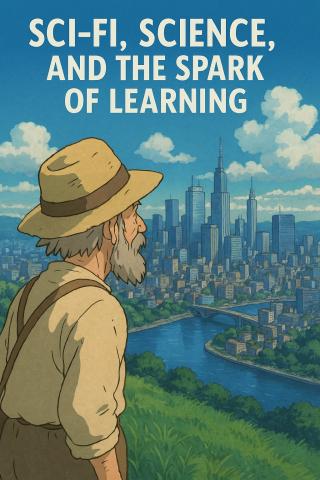
Sci-Fi, Science, and the Spark of Learning
The month of April offers a small window for educators to think beyond examinations. I had the opportunity to watch a movie called Oxygen. It's a science fiction film, and what’s amazing about sci-fi is that today’s fiction often becomes tomorrow’s reality. Many things that once seemed like mere imagination have eventually turned into real possibilities. Imagine a person from the pre-industrial era suddenly appearing in one of our modern cities—everything would seem like fiction, almost unbelievable. But the human mind has the potential to turn the impossible into possible. And that is where the central story of the movie lies.
Science is steadily moving toward one of humanity’s deepest desires—to live forever. Of course, not everyone may agree with this pursuit, but for those in positions of power, it seems to be a universal truth. The movie explores the ideas of cloning and memory transfer. As early as 1996, scientists announced the successful cloning of a sheep named Dolly. However, further research in this field was officially discouraged due to ethical concerns and the potential for misuse. Still, cloning was never entirely banned and continues to inspire scientific inquiry.
Memory transfer is another area that fascinates neuroscientists. We're only at the beginning stages, but the idea that we might one day be able to download, delete, or share human memory—much like we do with data on computers—can’t be ruled out.
Transferring memory into a cloned body presents a formula for human immortality—not immortality in a mythical sense, but in terms of continuity. The film explores this concept: an aging person could clone their body and transfer their memory into the new one, gaining a fresh lease on life. While this remains science fiction for now, it amazes me how such ideas push us to think beyond limits.
And it’s not just about transferring memory to another human body—what if memory could also be transferred to a machine? Imagine a machine imbued with human behaviors and emotions. Some sci-fi films have already imagined this reality.
Meanwhile, scientists working in the field of longevity are more focused on Gene Editing. Gene editing allows scientists to modify an organism’s DNA by adding, removing, or altering specific genes—much like editing a document, except instead of words, they’re tweaking the instructions of life. This is a major area of research in the quest to extend human life. By modifying genes linked to aging, scientists aim to repair damage and prevent age-related diseases. While we haven't yet reached a point where we can simply “flip a switch” to live forever, significant progress is being made.
I believe this is the perfect time to use this small window to expose our students to the incredible advancements in science and human capability. It could give them a glimpse of the limitless possibilities that lie ahead. Otherwise, the world around them often teaches them only to accept what already exists. But one of the purposes of education is to rebel against such limitations. We can’t teach rebellion, but we can certainly expose them to the boundless potential of the human mind.
- Log in to post comments
